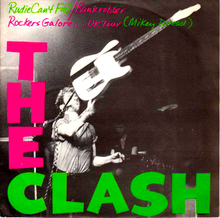| "Rudie Can't Fail" | |
|---|---|
 Dutch single release | |
| Song by the Clash | |
| from the album London Calling | |
| B-side | "Bankrobber" / "Rockers Galore... UK Tour" |
| Released | 14 December 1979 |
| Recorded | June–July, 1979 |
| Genre | |
| Length | 3:26 |
| Label | CBS |
| Songwriter(s) | Joe Strummer, Mick Jones |
| Producer(s) | Guy Stevens |
"Rudie Can't Fail" is a song by the English punk rock band the Clash, featured on their 1979 album London Calling. The song was written by Joe Strummer and Mick Jones, who sing it as a duet.
Composition
Like some songs on London Calling, "Rudie Can't Fail" has a strong reggae, rocksteady influence. Donald A. Guarisco of Allmusic described it as "an exuberant horn-driven number that mixes pop and soul elements in to spice up its predominantly reggae sound".[2]
Lyrics
"Rudie Can't Fail" praises the rude boys of Jamaica in the 1960s who challenged their elders' status quo. The song is about a fun-loving young man who is criticised by his elders for not acting as a responsible adult, drinking beer at breakfast,[3] and describe him as being "so crude and feckless", to which he responds "I know that my life make you nervous, but I tell you I can't live in service."[2] The song's title derives from Desmond Dekker's 1967 song "007 (Shanty Town)", and is in homage to Ray Gange, who had portrayed a roadie who quits his job to follow the Clash around in the 1980 film Rude Boy.[4] Rudie Can't Fail was the working title of a planned second movie for which The Clash would provide the soundtrack.[5] Reference is made also to Dr Alimantado, in the line "Like the doctor who was born for a purpose".[6] The line "You're looking pretty smart in your chicken skin suit", may refer to Alimantado's debut album, Best Dressed Chicken in Town.
See also
- Rudy's Can't Fail Cafe, a diner in California named after the song
References
- ^ "The Clash's 20 greatest songs of all time - Far Out Magazine". faroutmagazine. Jack Whatlet. Retrieved 8 February 2022.
- ^ a b Rudie Can't Fail at Allmusic
- ^ Perone, James E. (2012). The Album: A Guide to Pop Music's Most Provocative, Influential, and Important Creations. ABC-CLIO. p. 162. ISBN 9780313379062. Retrieved 25 February 2013.
- ^ Gray, Marcus (2004). The Clash: Return Of The Last Gang In Town. Hal Leonard. pp. 253, 307. ISBN 9781617749179. Retrieved 25 February 2013.
- ^ Thompson, Dave (2000). Alternative Rock. Hal Leonard. p. 134. ISBN 9780879306076. Retrieved 25 February 2013.
- ^ Moskowitz, David Vlado (2006). Caribbean Popular Music: An Encyclopedia of Reggae, Mento, Ska, Rock Steady, and Dancehall. Greenwood. p. 296. ISBN 9780313331589. Retrieved 24 February 2013.
